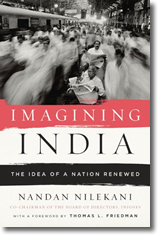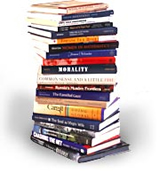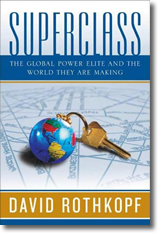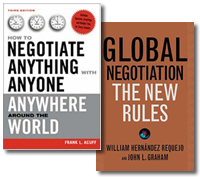Book Reviews: As China Goes, On China
Tuesday, September 27th, 2011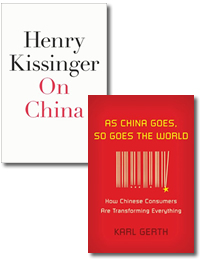
Gerth, Karl. As China goes, so goes the world : how Chinese consumers are transforming everything. Hill and Wang, 2010.
Kissinger, Henry. On China. Penguin Press, 2011.
In 1980, a group of educators from China came for a tour of my research library at Ohio State. At that time, three massive databanks, Dialog, BRS and SDC comprised the online environment, and librarians with technical training searched them using “dumb terminals” and acoustic couplers. As the Chinese visitors stood there with stony faces, the American translator struggled to explain the mechanics of database searching when there was no word for “computer” in Chinese. When Elizabeth J., a PhD student from Taiwan, dropped by, the visitors crowded around her, showering her with questions.
A generation later, Shanghai is among the most advanced cities in the world and China is rapidly developing an American-style consumer culture, due in part to their close association with Taiwan. Karl Gerth in As China Goes, So Goes the World explains that after 1987, a shared history and common interests between China and Taiwan enabled a rapid flow of capital, products and people between the two countries. China offered market opportunities for entrepreneurs and lower prices for consumers. Shanghai accommodated immigrating Taiwanese leaders and visionaries with luxury condos, popular restaurants and international schools.
Today Americans and Europeans see China as a gigantic market for consumer products, yet the choices made by these ordinary citizens have profound implications for labor, human rights, social inequality, the environment, and competition for resources. This vivid portrait of China is both enlightening and entertaining, with topics such as China’s transformation into a car culture, the creation of a new aristocracy, and the marketing of counterfeit brands.
A dense yet remarkable new book is Henry’s Kissinger’s On China, part history, part memoir by the first American emissary to communist China. Kissinger engineered the U.S.’s 1971 opening to Beijing, after decades of separation. Eventually he made more than 50 trips to China and met with four generations of Chinese leaders.
To understand China is to understand its long history. Kissinger provides a historical perspective as he analyzes the philosophical differences between China and the US. He draws on personal experience as he analyzes the country’s approach to diplomacy, strategy and negotiation. He reflects on the future of this global power in the 21st century. This important book is destined to be a best-seller for years.
© Reviewer: Meg Trauner & Ford Library – Fuqua School of Business.
All rights reserved.
 This year’s 2010 Duke MBA India Business Forum will be held on Sunday, March 28th. It is titled “India: Turning the Lens on Tomorrow” and will address important economic forces impacting Asia’s third largest economy in global business. Please see the following books from the Ford Library or check out our India display in the Economics section. Click on a link to check availability or to place a hold.
This year’s 2010 Duke MBA India Business Forum will be held on Sunday, March 28th. It is titled “India: Turning the Lens on Tomorrow” and will address important economic forces impacting Asia’s third largest economy in global business. Please see the following books from the Ford Library or check out our India display in the Economics section. Click on a link to check availability or to place a hold.

